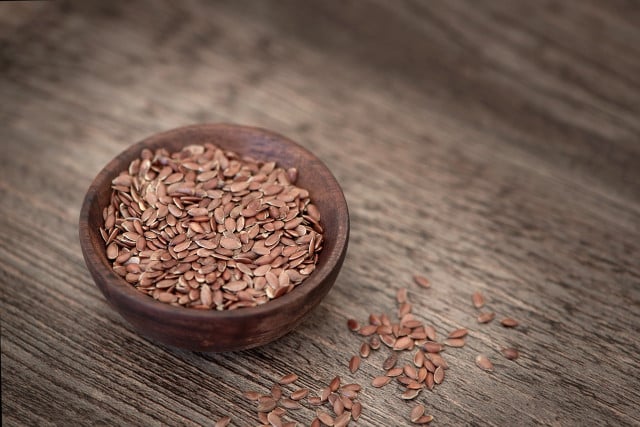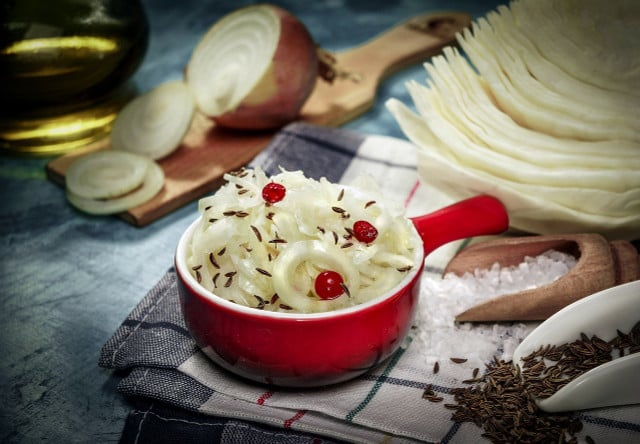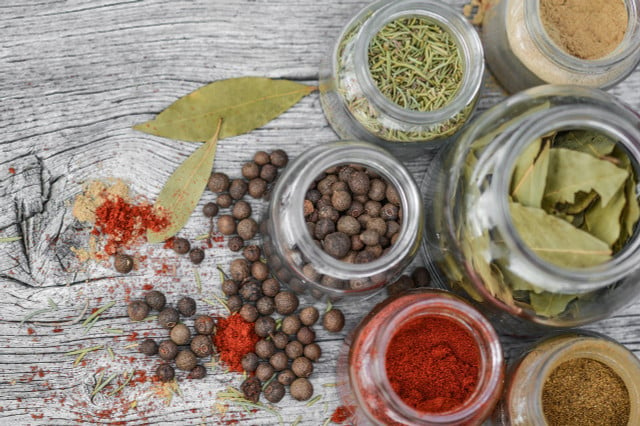
Do you have digestive problems? Here you can find out how you can stimulate your digestion and which foods are particularly recommended for this. This way you can counteract typical symptoms such as feeling full, bloating and stomach pain.
Sluggish digestion makes us tired, weak and more susceptible to problems such as constipation and flatulence. It is usually caused by an unbalanced diet that is low in fiber. But stress and too little exercise also have a negative effect on our digestive system.
In this article, you will learn all about various home remedies that can help stimulate your digestion and thus make your everyday life a little easier.
Stimulate digestion: Basics

(Photo: CC0 / Pixabay / Invitation_to_Eat)
If you want to support your digestion through the right diet, you can follow a few basic principles and tips:
- Include plenty of fiber-rich foods such as whole grain products, fruit and vegetables, as well as seeds and nuts in your diet. You should also make sure that you provide your body with sufficient macro and micronutrients. According to the German Nutrition Society, fiber is a great aid to digestion because, among other things, it influences the so-called transit time, the “travel time” of your food in the stomach and intestines. The fermentation of fiber also produces various fatty acids that can serve as an energy source for your body.
- Make sure you drink enough water throughout the day. The Techniker health insurance company recommends drinking at least two to three liters a day. It’s best to drink water or unsweetened tea.
- Last but not least, exercise can help to stimulate your digestion. It is not for nothing that people talk about a little “digestive walk” after a hearty meal. So make sure you get enough exercise every day. This could be a short walk, a yoga class or a more challenging workout at home.
Stimulate digestion with linseed

(Photo: CC0 / Pixabay / Pezibear)
Flaxseeds are a proven and effective remedy for sluggish digestion. They owe their digestive regulating properties to the mucilage they contain. These are fibers and swell in the intestine when combined with liquid. This puts pressure on the intestinal wall, which stimulates the intestine to digest.
To stimulate your digestion, you should consume around 15 to 20 grams of flaxseed daily. That’s about two to three tablespoons. So that your body can use the seeds, you should always consume them in crushed form: you can either buy them already crushed or grind whole flaxseeds into powder in a blender (also read: Grind flaxseeds: How to do it with different tools).
For example, add the seeds to your morning muesli or a smoothie. Flaxseeds also go well with (homemade) yoghurt or porridge. Alternatively, you can mix a tablespoon of flaxseed with around 250 milliliters of water two or three times a day. Let the mixture swell briefly before drinking it.
Note: Your daily dose of flaxseed should not exceed 20 grams. This is because the seeds need a lot of water to swell in the intestines and thus remove fluid from your body. Therefore, you should drink enough throughout the day when you consume flaxseed.
Wheat bran against sluggish digestion

(Photo: CC0 / Pixabay / aking1000)
Wheat bran is one of the foods richest in fiber. It contains around 45 grams of fiber per 100 grams. In comparison, oat flakes and whole wheat flour contain around ten grams.
In the case of wheat bran, the swollen fiber also creates strong pressure on the intestinal wall. This stimulates digestion and allows the stool to be transported through the intestine more quickly.
If you have digestive problems, it is recommended that you take one to three tablespoons of wheat bran two to three times a day. You can also easily stir bran into yoghurts, muesli and smoothies – or you can enjoy it pure with a glass of water or juice. Many types of bread and rolls also contain bran. You can find more ideas here: Wheat bran recipes: How to use the high-fiber grain product.
Bran also needs a lot of water to swell. If you take the seeds for digestive problems, you should drink at least two to three liters that day.
Stimulate digestion with fermented products

(Photo: CC0 / Pixabay / 4174332)
The term fermentation comes from Latin and means fermentation. It describes a process in which organic substances are converted by microorganisms. This produces lactic acid, which means that fermented products usually taste sour. Originally, foods were fermented primarily to make them last longer. Today, fermented foods are also consumed for health reasons, to stimulate digestion.
Fermentation means that fermented foods contain valuable lactic acid bacteria and enzymes. These have a supportive effect on the intestinal flora. This keeps your intestines healthy and can prevent many diseases caused by parasites, fungi and “bad” bacteria. They also have a calming effect on intestinal infections or irritable bowel syndrome.
Examples of fermented foods include:
- raw sauerkraut
- Kombucha
-
Soy, coconut or natural yoghurt
- kimchi
- Tempeh
- kefir
- Buttermilk
Fermented vegetables from the supermarket are often pasteurized and therefore no longer contain active bacteria and enzymes. Therefore, make sure you buy raw foods. You can get them at markets, organic shops or delicatessens, for example. You can also make your own fermented vegetables. You can find out how to do this in our article “Fermentation: Preserving food like grandma used to do”.
Prunes for healthy digestion

(Photo: CC0 / Pixabay / congerdesign)
Another proven home remedy for digestive problems is prunes. The reason for this is that the dried fruit contains a lot of fiber. In addition, scientists at Texas A&M University at the University of North Carolina have shown in a study that regular consumption of prunes reduces the risk of colon cancer.
This is partly due to the high antioxidant content of plums. On the other hand, they promote the formation of healthy intestinal bacteria and thus ensure a healthy intestinal flora.
If you have a sluggish digestion, it is best to eat two or three prunes every morning on an empty stomach – this stimulates digestion. You can soak them in a little water the evening before and leave them to steep overnight. Drink one or two glasses of water with it.
Make sure to buy unsulfured dried fruit. Sulfurized products can cause side effects such as headaches and nausea in some people.
Stimulate digestion with herbs and spices

(Photo: CC0 / Pixabay / monicore)
It makes sense to spice up dishes with lots of different herbs and spices, and not just for taste reasons. Basil, cardamom and other herbs can also have a positive effect on your digestive system. The essential oils and spicy substances they contain are said to stimulate digestion and have a calming effect on flatulence, nausea or a feeling of fullness.
Herbs and spices that you can always include in your diet include:
- Fennel seeds
- Ginger
- anise
- Caraway seeds
- cardamom
- basil
- Garlic
- chamomile
- turmeric
You can also take many of these spices as tea. For example, you can drink the typical fennel-anise-caraway tea after a meal to further relieve your digestive system. Chamomile tastes good in the form of chamomile tea and is said to relieve stomach cramps.
Read more on Techzle\.com:
- Ayurveda recipes: For breakfast and dinner
- Is raw food healthy? 12 questions and answers about raw food nutrition
- Probiotic foods: In this list you will find the most important
Edited by Freya Petersen
** marked with ** or orange underlined Links to sources are sometimes affiliate links: If you buy here, you are actively supporting Techzle\.com, because we then receive a small part of the sales proceeds. More information.